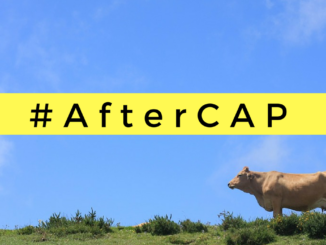
Under pressure from farmer protests, upcoming elections and its own cowardice in the face of climate and biodiversity collapse, the political establishment in Brussels and beyond is fast-tracking the evisceration of CAP’s environmental elements. This rush job began on 15th March with a proposal from the Commission, and will likely end Thursday 25th when the last full plenary of the Parliament rubber stamps the proposed regulation. The latest piece of sequencing was confidential legal advice given to the European Parliament on the process. In part one Natasha Foote outlined the proposal and the legal advice. Here Oliver Moore applies a critical analysis to shortcomings therein.
On 15th March the Commission proposed scrapping many of the mandatory environmental components of CAP. These are the GAECs (rules for Good Agricultural and Environmental Condition, called conditionality informally) and checks for small farmers. With the mandate about to end, time is of the essence for fast tracking these changes. There is just one plenary session left to rubber stamp the process, and that’s the week starting 22nd April.
Legal advice was offered to the Parliament on 15th April on this very unusual and rapid process – after all the CAP was only agreed in 2021 and was due to run from 2023 to 2027. Can CAP’s objectives still be met, and is this proposal compliant with EU climate and other laws? In part one of this two parter, Natasha Foote (article below) outlined what was in the advice. There, core considerations such as the legality of the manoeuvre, the lack of an impact assessment and the issue of small farmer exemptions were unpacked. The advice gave the green light for the process to continue, with some mild caveats or suggestions. Here we delve more deeply into the arguments made, and add critique.
Confidential Legal Advice on CAP Fast Track Uncovered – what’s in it?
Read/Download CAP Regulation (EU) 2021/2115
Read/download the Commission’s published proposal as of 15/03/24 COM(2024)139_0 (Minor changes are proposed by both the Council and Parliament to this version. A consolidated version is being voted on week of 22-25th)
Objectively speaking
Of all the GAECs, GAEC 8 was signaled out for special attention. The legal letter notes how changes to GAEC 8 could be more “substantial” and “far reaching”, as they will “remove most of the elements of that standard”. GAEC 8 is the ‘space for nature’ or ‘ecological focus areas’ GAEC, allowing for a minimal amount of arable land to be dedicated to nature, usually 4% but in some cases up to 7%.
Based on the earlier but equivalent ecological focus areas figures from 2019, our preliminary analysis analysis (forthcoming, but see below) shows that over 9 million hectares of land will be subject to pesticide spraying with this change in GAEC 8. So this is indeed “substantial” as the experts suggest.
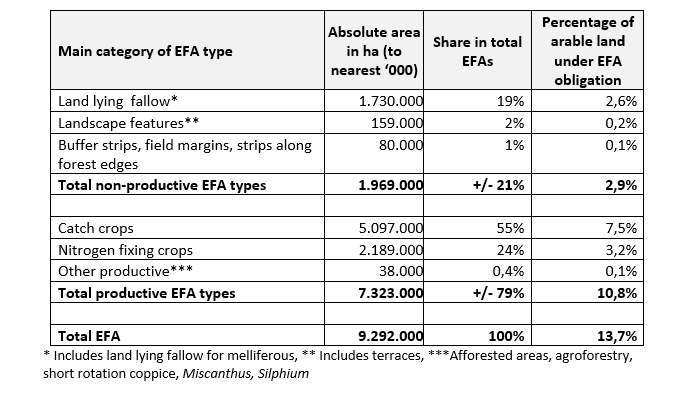
What will be lost too are cover crops, nitrogen fixing or leguminous crops, wildflower strips to attract beneficial species like pollinators and predators of pests. All of this, along with the the loss of crop rotation, will make pesticide reduction far more difficult in the years ahead.
The letter states that “the Commission proposes to remove most elements from that standard, and shift them to support by Member States of eco-schemes covering practices for the maintenance of non-productive areas, and for the establishment of new landscape features on arable land.”
The letter also points out that this could shift the balance between CAP objectives. However it states that changing GAEC 8 from mandatory to voluntary, and removing most aspects of it, “would merely be the expression of a policy decision to give precedence to objectives related to flexibility and reduction of administrative burden over environmental/climate objectives, with respect to the specific elements contained in the Proposal”.
However there are 10 CAP objectives (see image). While “climate change action” and “environmental care” are two of them, there is no such overarching objective for “flexibility” nor “administrative burden”.
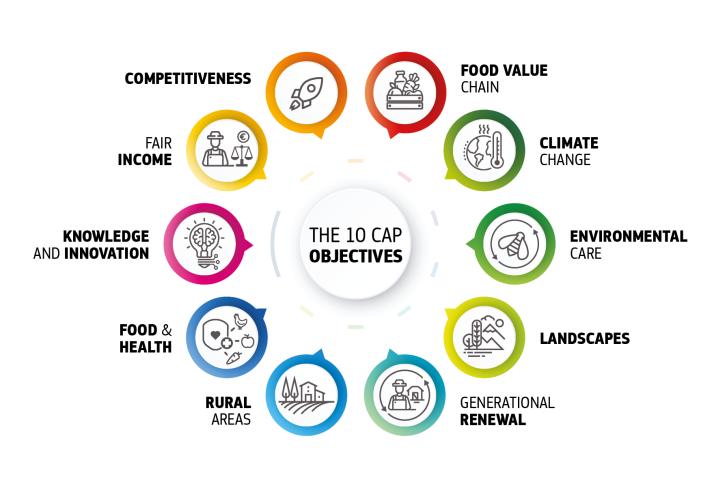
Indeed, the use of the words “related to” in itself shows how weak this argument from the legal service is. While climate and environment are objectives, flexibility and administrative burden are merely related to (unnamed) objectives.
Perhaps flexibility and reduction of administrative burden are “related to” the competitiveness or income objectives? Not only is it not stated or explained, the very fact that flexibility and admin burden are not core objectives – whereas climate and environment are – speaks volumes.
The impression is created that core environmental objectives are not actually as important as economic ones. After all, ancillary – and indeed contestable – aspects to economic objectives are taking priority over actual environmental objectives.
Indeed the downgrading to voluntary options, supposedly related to eco-scheme availability, could be seen to make for unfair competition between EU member states. Some will offer eco schemes, others won’t. How does this enhance competitiveness, when it unlevels the playing field?
Crucially, there is no compulsion in the proposed legislation for member states to actually offer voluntary eco-schemes which compensate for the huge range of options taken out of GAEC 8. And in any case, it is almost impossible by definition, and in any case very unlikely, that voluntary schemes will see the same take up as mandatory schemes. This is backsliding, which is not supposed to be happening.
The “no-backsliding” principle (Article 105 of the CAP Strategic Plan Regulation) means member states retain the current level of environmental investment, with “greater overall contribution to the achievement of the specific environmental- and climate-related objectives”. How is this is happening with the GAECs?
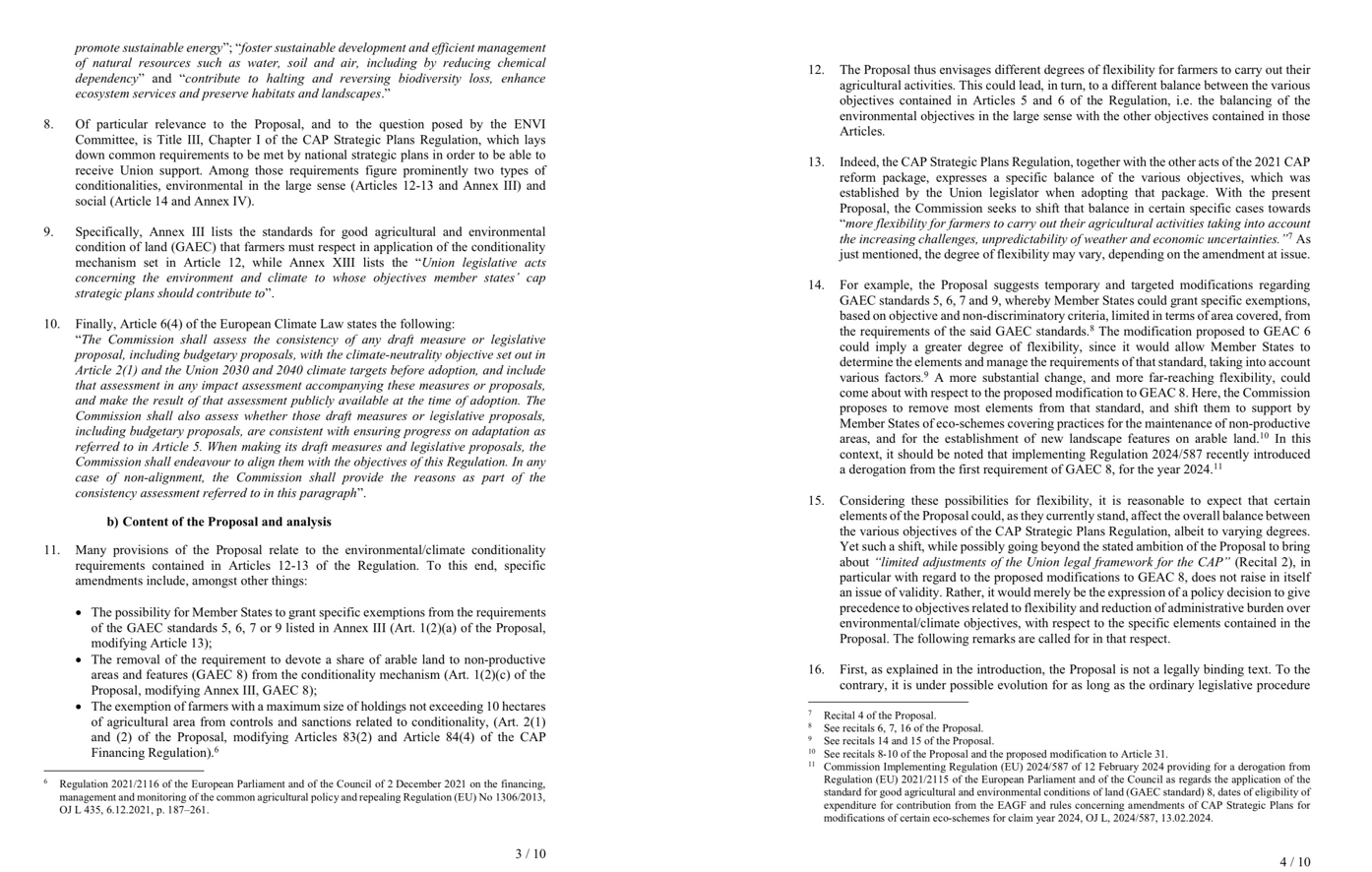
Assessment of the lack of an impact assessment
While an impact assessment isn’t legally required, according to the legal experts, they also inadvertently make the case for actually conducting one. Without it, these experts appear to be chasing their tails. The legal opinion notes that certain elements are beyond its scope – due in part to the lack of impact assessment.
For instance, in the absence of an impact assessment, the service concluded it was “impossible” for it to identify and quantify the exact impact, if any, of the proposed modifications on the overall climate/biodiversity expenditure target for the entirety of the programming period. This is something that is a task for the Commission, it concludes.
It also notes that “nothing prevents” the Union legislator from requesting the Commission to carry out a complementary impact assessment, or to carry out its own such assessment.
One thing that does certainly hinder conducting an impact assessment is the quality of the comparable data year on year. Already, with a number of derogations already being granted to GAECs, the basic facts are not demonstrable. Derogations granted to the GAECs in 2023, the Commission did not provide data on areas and numbers of beneficiaries concerned.
Of course monitoring and evaluation of CAP from various perspectives, including value for money for EU citizens, will get more difficult again with the wider move to voluntary GAECs.
Regular EU agri-watchers will no doubt note that calls for an impact assessment are often loud, regular and even repeated -when it comes to actually trying to deliver even the mildest of real change. In the case of the SUR (the discontinued pesticide regulation) there were not one but two impact assessments demanded. In fact, both showed the proposal to be doable and to have a negligible impact on food security. However political machinations took over, with an outright rejection of the proposal by Parliament followed by an official death declaration from Commission President Ursula Von der Leyen. Too often, facts don’t matter.
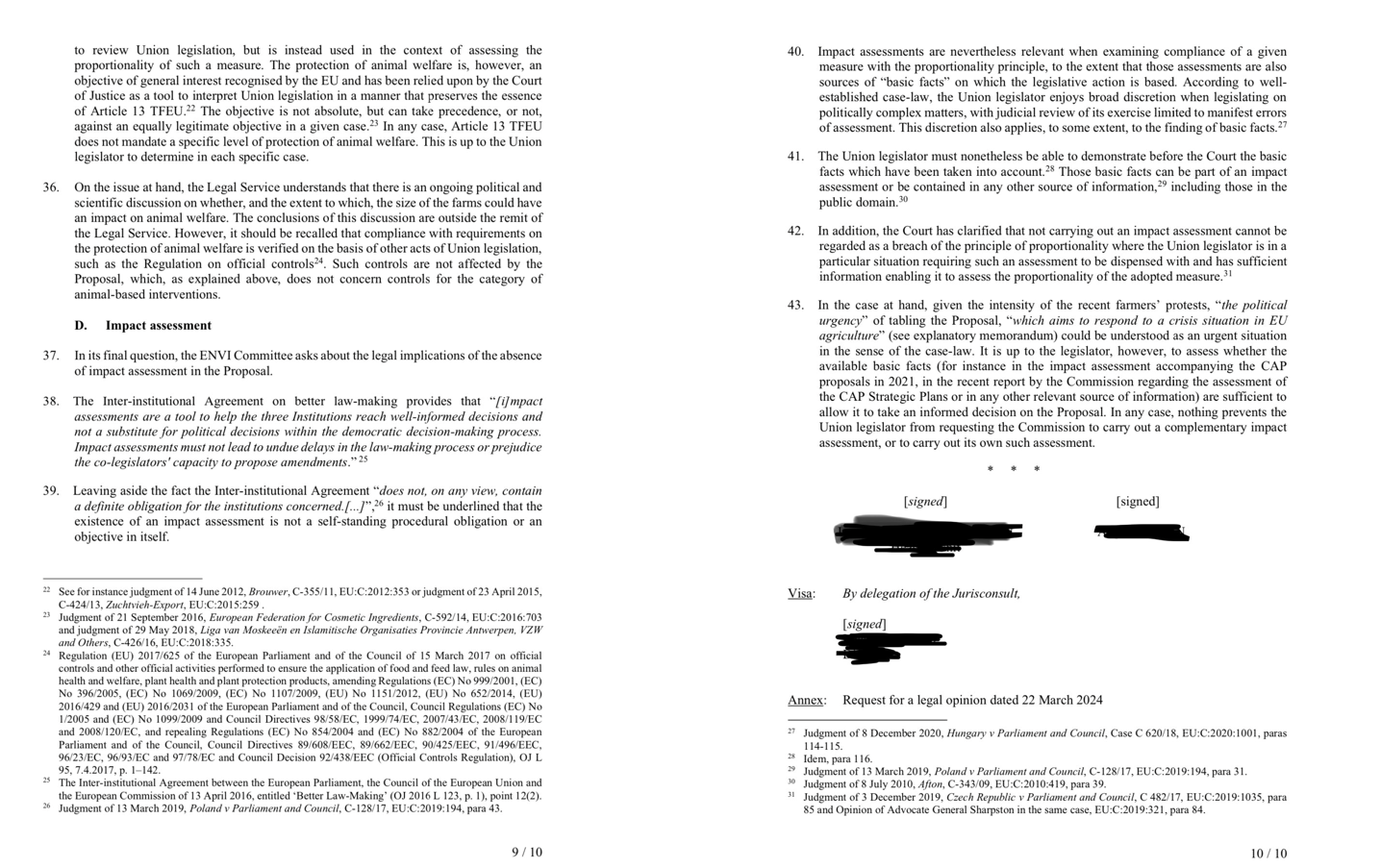
Size matters
A huge part of the current Commission proposal, being rushed through the institutions at the fastest possible pace, is the exemption of 2/3 of all farmers – those under 10 hectares – from any CAP inspections.
Farmers with over 10 ha may wonder about the aforementioned CAP objective on competitiveness – is there a level playing field if a neighbour has no inspections but you have inspections?
The opinion also notes that, given the number of beneficiaries that would benefit from this exemption, the Union legislator “could explore ways to avoid that the proposal potentially incentivises “bigger farmers” (with holdings exceeding 10 ha) to reduce the territorial scope of their farms, in order to fall under the exemption.”
As such, it suggests it could also assess “whether the size of the farm is sufficient as the only criterion to determine who should benefit from the proposed exemption”.
Considering what’s at stake in terms of money and risk, these seem to be very meek suggestions indeed.
Numerous reports, including for the European Parliament (see link below) and by the New York Times, have revealed shocking misuse of CAP funds, including via the practice of breaking up big farms into supposedly smaller ones.
This 2019 report on Bulgaria, Czech republic, Hungary, Romania and Slovakia reported on the practice whereby oligarchs split up companies “in order to evade the EU agricultural payment caps” (which) remains a big issue”.
According to the research commissioned by the Greens/EFA group for the European Parliament, the current rules and procedures fail: “it seems that it is even a common practice, for example in Bulgaria or Hungary, that big farmers divide their estates into several companies. A similar problem was also indicated by small farmers in the Czech Republic.”
Damning Report on CAP Cash in Central and Eastern Europe Released
This is serious stuff, involving billions of Euros, and is even implicated in the deaths of investigative journalists .
Renationalisation was cited as a risk when these reported cases of misuse of CAP funds were revealed: the current plan is to fast-track renationalisation, and to exempt small farmers from any CAP related inspections, despite the risk this legal advice itself names.
Conclusion
Despite these areas of concern revealed here, this legislation is being rushed through the institutions. Indeed it is being rushed against the Rules of Procedure as translations are not being made of the proposed legislation in time.
Before the vote earlier this week the Greens/EFA lodged a complaint about this. It stated “In accordance with Rule 180(6), amendments shall be put to the vote only after they have been made available in all the official languages, unless Parliament decides otherwise. Parliament may not decide otherwise if at least 38 Members object.”
As the Green group objected, this, under normal procedures, would have stalled the legislation. But these are not normal times it seems. The chair of the Agri Commission Norbert Lins ignored this on Monday 15th April, when adopting the Council position as the Parliament’s.
Hidden away in the gentle language and inevitable analytical dead ends of the Parliament’s legal advice, real worries remain. The exemptions, lack of impact assessment and move to voluntary, all being rushed through without proper oversight or even translations, will have repercussions for years to come. There is such a mess made of the ability to even compare things, and to do monitoring and evaluation, that it will be hard to see or even know how CAP – this huge monster in the middle of the EU’s budget – is implicated.
For this to be the final parting shot of the EU institutions is perhaps appropriate. They have not only metaphorically salted the land, they have messed with the ability for us to even know how much damage is being done. And this wanton disregard for climate and biodiversity breakdown will likely continue, even as the reality gets worse and worse.
More
Confidential Legal Advice on CAP Fast Track Uncovered – what’s in it?
Parliament Pushes Full Steam Ahead to Dismantle CAP’s Green Rules




